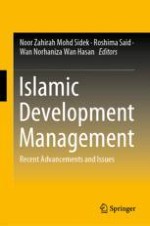2019 | OriginalPaper | Chapter
The Awareness of Wasiyyah (Will Writing) Practice Among Muslims
Authors : Hasmah Laili Jamalurus, Siti Fairus Mokhtar, Hasni Abd Rahim
Published in: Islamic Development Management
Publisher: Springer Singapore
Activate our intelligent search to find suitable subject content or patents.
Select sections of text to find matching patents with Artificial Intelligence. powered by
Select sections of text to find additional relevant content using AI-assisted search. powered by
